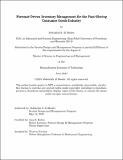Forecast-Driven Inventory Management for the Fast-Moving Consumer Goods Industry
Author(s)
Al Mesfer, Abdulelah S.
DownloadThesis PDF (3.774Mb)
Advisor
Rubin, Joan S.
Terms of use
Metadata
Show full item recordAbstract
This thesis investigates the development and evaluation of various demand forecasting models for the Fast-Moving Consumer Goods (FMCG) industry on real-world data to devise an inventory control policy for a third-party logistics provider. Demand forecasting is crucial in the retail industry, influencing supply chain management, inventory control, and pricing strategies. Accurately predicting demand is essential for optimizing resource allocation, reducing stockouts, and minimizing holding costs. In this study, we employ several time series models, including traditional time series models, such as ARIMA and SARIMA, and machine learning techniques, such as Random Forests, XGBoost, and Prophet, to forecast retail demand. The performance of these models is assessed using time series cross-validation techniques and accuracy measures, such as RMSE, MAPE, and MAE. Data preprocessing steps, including resampling, imputation of missing values and outliers, SKU prioritization, and feature engineering, are performed to enhance the reliability of the forecasting models. The results indicate that XGBoost outperforms the other models, showcasing its ability to generate accurate FMCG demand forecasts. Based on the forecasting error, a continuous review (s,Q) policy is formulated to improve inventory management for the third-party logistics provider. The proposed inventory control policy demonstrates the potential to minimize holding costs for the FMCG industry. Future research directions include the investigation of additional forecasting models, the integration of external factors, and the extension of the study to other retail contexts.
Date issued
2023-06Department
System Design and Management Program.Publisher
Massachusetts Institute of Technology